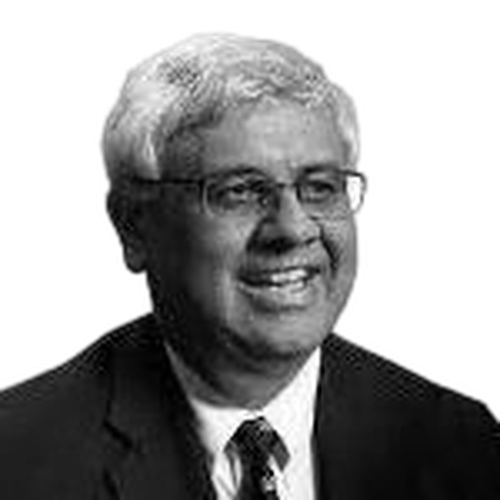Berkeley Partners

Richard K. Lyons
Chief Innovation and Entrepreneurship Officer, UC Berkeley
Richard K. Lyons became the Bank of America Dean of the Haas School of Business, University of California, Berkeley, in July 2008. He is a graduate of the school’s undergraduate business program. Before becoming dean, Lyons served as the chief learning officer at Goldman Sachs in New York, where he was responsible for leadership development among the firm’s managing directors. His academic research has explored currency markets, a focus reflected in his book “The Microstructure Approach to Exchange Rates” (MIT Press). Recently, his research has taken a quite different tack, namely, exploring the links between leadership and innovation in organizations. These links are strategically important to the Haas School’s approach to developing business leaders. Dean Lyons is a member of the Council on Foreign Relations. His past consulting relationships include the Federal Reserve Bank, the International Monetary Fund, the European Central Bank, and Citibank. In 1998 Lyons received UC Berkeley’s highest teaching honor, the Distinguished Teaching Award.

Shankar Sastry
Professor of Electrical Engineering and Computer Science, Professor of Bioengineering, Thomas M. Siebel Professor
Shankar Sastry received his B.Tech. from the Indian Institute of Technology, Bombay, in 1977, an M.S. in EECS, an M.A. in Mathematics, and a Ph.D. in EECS from UC Berkeley in 1979, 1980, and 1981 respectively. He holds faculty appointments in the Departments of Electrical Engineering and Computer Sciences, Bioengineering, and Mechanical Engineering and served as dean of the College of Engineering from 2007 to 2018. He was formerly the Director of CITRIS (Center for Information Technology Research in the Interest of Society) and the Banatao Institute @ CITRIS Berkeley. He served as chair of the EECS department from January 2001 through June 2004. In 2000, he served as Director of the Information Technology Office at DARPA. From 1996-1999, he was the Director of the Electronics Research Laboratory at Berkeley, an organized research unit on the Berkeley campus conducting research in computer sciences and all aspects of electrical engineering. He is the NEC Distinguished Professor of Electrical Engineering and Computer Sciences and holds faculty appointments in the Departments of Bioengineering, EECS, and Mechanical Engineering. Before joining the EECS faculty in 1983, he was a professor at MIT.

Bradford DeLong
Professor of Economics
Bradford DeLong is a professor of economics at U.C. Berkeley, a research associate of the National Bureau of Economic Research, a weblogger at the Washington Center for Equitable Growth, and a fellow of the Institute for New Economic Thinking. He received his B.A. and Ph.D. from Harvard University in 1982 and 1987. He joined UC Berkeley as an associate professor in 1993 and became a full professor in 1997. Professor DeLong served in the U.S. government as Deputy Assistant Secretary of the Treasury for Economic Policy from 1993 to 1995. He worked on the Clinton Administration’s 1993 budget, the Uruguay Round of the General Agreement on Tariffs and Trade, the North American Free Trade Agreement, macroeconomic policy, and the unsuccessful health care reform effort. Before joining the Treasury Department, Professor DeLong was Danziger Associate Professor of Economics at Harvard University. He has also been a John M. Olin Fellow at the National Bureau of Economic Research, an Assistant Professor of Economics at Boston University, and a Lecturer in the Department of Economics at M.I.T.

AnnaLee Saxenian
Former Dean, UC Berkeley’s School of Information
AnnaLee Saxenian is a UC Berkeley School of Information professor and has a joint faculty appointment with the Department of City and Regional Planning. Her latest book, The New Argonauts: Regional Advantage in a Global Economy (Harvard University Press, 2006), explores how and why immigrant engineers from Silicon Valley are transferring their technology entrepreneurship to emerging regions in their home countries—Taiwan, Israel, China, and India in particular—and launching companies far from established centers of skill and technology. She argues that the “brain drain” has now become “brain circulation” — a powerful economic force for developing formerly peripheral regions that are sparking profound transformations in the global economy. Saxenian is also the author of the widely acclaimed Regional Advantage: Culture and Competition in Silicon Valley and Route 128 (Harvard University Press, 1994). Other publications include Silicon Valley’s New Immigrant Entrepreneurs (Public Policy Institute of California, 1999) and Local and Global Networks of Immigrant Professionals in Silicon Valley (PPIC, 2002). She holds a Ph.D. in political science from MIT, a master’s in regional planning from UC Berkeley, and a B.A. in economics from Williams College.

Yahya Tabesh
Senior Fellow and Lecturer
Yahya Tabesh is a Senior Fellow at the AMENA Center for Entrepreneurship and Development. He has been a Visiting Professor and a Research Fellow at Stanford University. He has served as a Distinguished Faculty at the Sharif University of Technology (Tehran-Iran) and was chairman of the department of Mathematical Sciences for four years. Dr. Tabesh was the director of Math and Computer Olympiads in Iran for many years and a pioneer in developing the Math House and Schoolnet. Dr. Tabesh was also responsible for developing mathematics textbooks and curricula for high school students as a member of the high council of educational reform in Iran. He won the Erdős International Award in 2010 for his sustained and distinguished contribution to the enrichment of math and computer education. Dr. Tabesh is currently working on cognitive and intelligence learning systems.

Amir Sepehri
Fellow
Amir Sepehri is a Fellow at the AMENA Center for Entrepreneurship and Development. Amir is a Research Data Scientist at Meta; he used to be a senior researcher at LinkedIn. He conducts applied research in machine learning, causal inference, experimentation, and fairness in AI. Amir has served as a scientific advisor to health-tech startups in the past. He has presented at top-tier academic conferences, including Joint Statistical Meeting (JSM) and ACM SIGKDD CONFERENCE ON KNOWLEDGE DISCOVERY AND DATA MINING (KDD). He has also delivered invited lectures at industry conferences and academic institutions, including the USF Data Institute and Duke’s Fuqua School of Business. Amir holds a Ph.D. in statistics from Stanford University and a B.Sc. in mathematics from the Sharif University of Technology.

Sara Beckman
Faculty Fellow and Teaching Professor
Sara is Earl F. Cheit Faculty Fellow at the Haas School of Business, where she designs and delivers courses on design, innovation, and product management, and a Teaching Professor in the Mechanical Engineering Department in the College of Engineering. Her 25 years of experience teaching design and innovation-related topics at the Haas School of Business culminated in creating a course, Problem Finding, Problem Solving, which is now offered to all business students at Haas. For the past two years, she has served as the Chief Learning Officer of the recently founded Jacobs Institute of Design Innovation within the University of California, Berkeley’s College of Engineering. Sara directs the Product Management Program for Berkeley’s Center for Executive Education each year, serving 350 product managers worldwide. Before joining Berkeley-Haas, Sara worked in the Operations Management Services group at Booz, Allen & Hamilton and ran the Change Management Team at Hewlett-Packard. Sara received her BS, MS, and Ph.D. degrees from Stanford University in Industrial Engineering and Engineering Management.

Mark Coopersmith
Fellow and Senior Lecturer in Entrepreneurship
Mark, an educator and entrepreneur has spent his career building high-growth companies and helping shape the next generation of business leaders. At Haas, Mark teaches the sought-after Workshop for Startups course, from which a broad range of innovative new ventures is regularly launched. Mark also co-teaches the pioneering course “The Other ‘F’ Word” about how insights from failure can drive innovation, growth, and long-term success. Mark is also an accomplished executive and an advisor to businesses ranging from VC-backed ventures to global corporations such as Intel and DirecTV. Previously Mark led the $350mm Global Technology Brands group at Newell Rubbermaid, founded and built a $150mm consumer products and online commerce division for Sony, and was the founding CEO of online payments venture WebOrder. Mark has been quoted in the Economist, the New York Times, and USA Today and has appeared in media, including Fox News, CNN, The Huffington Post, and NPR. Mark also mentors aspiring entrepreneurs and teams, including those working at the UC Berkeley SkyDeck accelerator. Mark is an alumnus of UC Berkeley, where he earned his BA and MBA degrees.

Amir Kermani
Associate Professor, Haas School of Business and Department of Economics
Amir Kermani holds joint positions as an associate professor at the Haas School of Business and the Department of Economics at the University of California Berkeley. His research interests include monetary policy, macroeconomics and housing, market securitization, and political economy. Before joining UC Berkeley in 2013, he received his Ph.D. from MIT human capital in emerging economies and industries.

Adam Sterling
Executive Director, Berkeley Center for Law, Business and the Economy
Executive director of the Berkeley Center for Law, Business, and the Economy (BCLBE) at Berkeley Law. Previously he was a startup attorney at Gunderson Dettmer and the co-founder and director of the Sudan Divestment Task Force and Conflict Risk Network (CRN). Adam currently serves as a non-resident senior fellow for the Enough Project at the Center for American Progress Adam’s writings and work have appeared extensively in the press, including contributions to The Wall Street Journal, The Financial Times, The New York Times, The Los Angeles Times, Fort Worth Star-Telegram, The San Francisco Chronicle, The Christian Science Monitor, and National Public Radio. He has appeared on several broadcast news programs, including CNN’s Situation Room and CNBC’s Street Signs.

Tanya Roosta
Fellow and Lecturer
Tanya Roosta is a fellow and lecturer at the AMENA Center for Entrepreneurship and Development and a senior research science manager at Amazon, Alexa AI. Her background includes the following education and training.
Ph.D. in Electrical Engineering and Computer Science, UC Berkeley. Masters of Financial Engineering, Haas Business School, UC Berkeley. Masters in Statistics, UC Berkeley. Masters in Electrical Engineering and Computer Science, UC Berkeley.
Dr. Tanya is focused on building machine learning systems in finance and high-tech. She provides technical leadership for teams of scientists and engineers. Her core expertise is in general ML, Natural Language Processing, and statistics.

Sina Tabesh
Fellow
Sina Tabesh is a Fellow at the AMENA Center for Entrepreneurship and Development at the Haas School of Business. He is also the founder and CEO of KrowdLearn, a San Francisco-based education technology startup with a mission to provide more tools and opportunities for language teachers and learners. He received his MBA from ISM in Paris, France. He is currently completing his Ph.D. dissertation in Entrepreneurship and Innovation and teaching courses in Strategic Management and Multi-Cultural Management at the same institution. Before founding his startup, he worked as a management consultant in France and the Middle East. In recent years, his multicultural experiences have enabled him to work with different communities as a board member and adviser in various French, American, and Middle Eastern nonprofit organizations in the Bay Area, where he has built entrepreneurship, innovation, and education bridges across varying communities. Sina serves on the board of directors of Alliance Française of San Francisco and is a board member of the Generarion+ initiative at the Pars Equality Center.

Elizabeth Kovats
Director, Berkeley Roundtable on Applied Innovation and Design
Elizabeth currently serves as Director of the Berkeley Roundtable on Applied Innovation and Design (BRAID). In this role, she cultivates a learning community comprised of Silicon Valley executives and UC Berkeley faculty, teaching design-related workshops to various industry partners. She has also served as a guest speaker at Stanford University’s d.school. Elizabeth focuses on adapting design principles for personal transformation and design and ethics. Previously, Elizabeth served as Associate Director of the International Business Development MBA course at Berkeley-Haas. She was responsible for significant program expansion and served as a faculty mentor to MBA teams working on high-technology consulting projects. Additionally, she co-led Seminars in Business courses in Turkey, Chile, Argentina, and South Africa.

Mohsen Hejrati
Fellow
Mohsen Hejrati is a Fellow at the AMENA Center for Entrepreneurship and Development. Mohsen Hejrati is Senior Director, Head of AI & Cloud Engineering at Genentech, where he is focused on large-scale machine learning platform systems. He is also a co-founder at Data for Life Academy, which actively advises startups and nonprofits in artificial intelligence, education, healthcare, and social impact. In the past, Mohsen founded the largest MOOC in Farsi and was a research engineer at Waymo. He has presented at first-ranked academic conferences, including IEEE Conference on Computer Vision and Pattern Recognition (CVPR), the European Conference on Computer Vision (ECCV), and Neural Information Processing Systems (NeurIPS). Mohsen holds a Ph.D. in computer vision and machine learning from the University of California, Irvine, and a BSc in Mathematics from the Sharif University of Technology.
